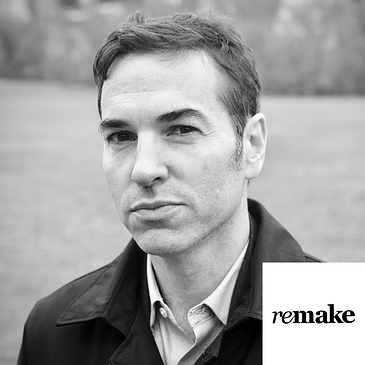Eyal Press is a regular contributor to The New Yorker and The New York Times. His most recent book is Dirty Work: Essential Jobs and the Hidden Toll of Inequality in America, which won the 2022 Hillman Prize and was named a New York Times Notable book. He's also the host of the podcast Primary Sources.
We spoke in mid-June 2022, and I was excited to talk to Eyal after getting a hold of his book, Dirty Work, which covers the ethically questionable, psychologically damaging work society delegates to marginalized, far away, or hidden workers. An example of this would be killer drone operators who sit in a safe command center in the US while killing people remotely underground in the Middle East, and the complexities of the systems we create to keep those jobs hidden and far away and removed from the so-called "good people". I found the conversation fascinating and challenging.
EPISODE SUMMARY
In this conversation we talk about:
- Him growing up as the son and grandson of Holocaust survivors and the perspective it gave him.
- The rarity of people who take a moral stand in the face of bad consequences.
- What Everett Hughes had to say about the people who keep themselves clean and good while knowingly ignoring horrors done in their name.
- The character of dirty work and the systemic structures that make it persist. We then dive into particular examples, such as prison systems in the US, drone warfare as an imagined way to clean up war, and things that Americans consume that have dirty work behind them.
- Moral injury and how unethical jobs can over time create real injury, psychological harm to the people performing them.
- The invisibility of dirty work.
- What can we do to clean up dirty work?
- And we dive into the Israeli occupation of Palestine and the extent to which Israeli society is delegating the dirty work of occupation to soldiers and military police, and the ways in which civil organizations like Breaking the Silence are trying to counteract that tendency.
It's impossible to talk to Eyal and not think about the places where I might be exporting unpleasant or unethical work to invisible hands while still benefiting from their work. And it's been useful to think about what I can do in these situations. Eyal provided a valuable and challenging framework to think about the world we live in and what's truly necessary to make it better — not only keep our own hands clean, but raising awareness and reforming systems that fund and perpetuate morally injurious work out of the site of so-called "good people".
This conversation is one of a dozen or so weekly conversations we already have lined up for you with thinkers, authors, scientists, designers, makers, and entrepreneurs who are working to change our world for the better. So follow this podcast on your favorite podcast app, or head over to RemakePod.org to subscribe.
And now, let's jump right in with Eyal Press.
TIMESTAMP CHAPTERS
[4:34] Life in the Present
[5:44] Family History Osmosis
[7:16] Beautiful Souls
[12:05] The Story of Everett Hughes
[17:48] The Structure of Dirty Work
[29:45] Moral Injury
[38:49] The Hidden Nature of Dirty Jobs
[42:28] Jobs of Last Resort
[44:38] The Good People
[50:13] Breaking the Silence
[56:49] The Dirty Work in Tech
[1:00:20] A Short Sermon
EPISODE LINKS
- Eyal's Links
- 🌎 Eyal Press Website
- 📘 Dirty Work: Essential Jobs and the Hidden Toll of Inequality in America
- 📘 Beautiful Souls: Saying No, Breaking Ranks, and Heeding the Voice of Conscience in Dark Times
- 📘 Absolute Convictions: My Father, a City, and the Conflict that Divided America
- 📝 The New Yorker - Eyal Press Latest Articles
- 🎧 Primary Sources Podcast
- 📣 Twitter: @EyalPress
- Other Links
- 📝 Good People and Dirty Work by Everett C. Hughes
- 🐷 Smithfield Foods
- 🐔 Sanderson Farms
- 🧚 Disneyland
- 🏫 University of Cambridge
- 🏫 Harvard University
- 🛂 ICE | U.S. Immigration and Customs Enforcement
- 📕 No Name in the Street by James Baldwin
- 🪖 Breaking the Silence
- 📦 Amazon
- 🎤 TED Talk - Alain de Botton
ABOUT US
- Remake Podcast: Visit us: RemakePod.org
- 🙏🏻 Rate the show on iTunes
- 🙏🏻 Support us! Join the Podcast Member community
- 💌 Share your thoughts: podcast@remakelabs.com
- 👉 Listen or Subscribe to the show: Apple Podcasts・Google Podcasts・RadioPublic・Overcast・Stitcher・PocketCasts・Castro・SoundCloud・Spotify・YouTube・Deezer
- Remake Labs: RemakeLabs.com・Medium・LinkedIn・Community・Twitter・Facebook・Instagram
- Eran Dror: EranDror.com・LinkedIn・Twitter・Medium

